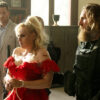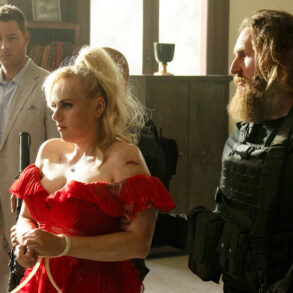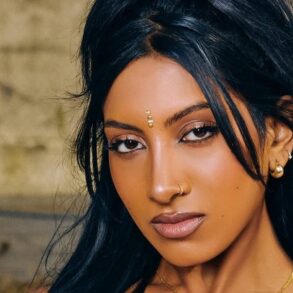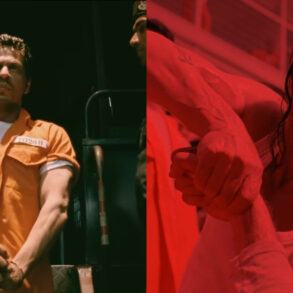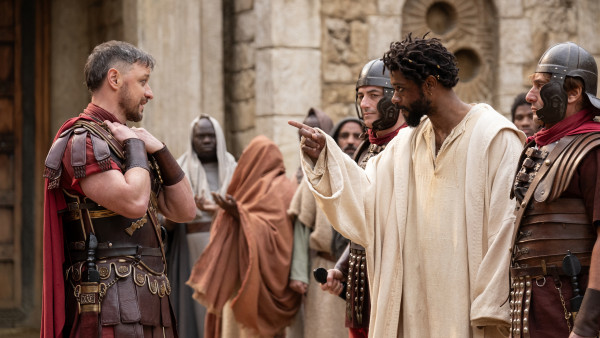
Film review: Hollywood’s obsession with diverse casting has fallen flat. Whilst Jeymes Samuels’s ‘The Book of Clarence’ is a refreshing departure from the stuffy, whitewashed Biblical films of the past, it nonetheless fails to fully hit the mark.
Ancient biblical epics have been in short supply of late. In the last decade, there were two released in the same year – 2014’s Noah and Exodus: Gods and Kings – plus 2018’s Mary Magdalene.
Although, arguably, there hasn’t been a worthy offering since 1998’s The Prince of Egypt. What they do have in common is most have seen white Western actors play or voice the Middle Eastern and North African roles.
“I do find the perpetuation of a black-and-white binary on-screen irksome, especially when it erases already marginalized people from history”
The Book of Clarence has arrived to buck the white-washing trend of the greatest story ever told with British writer-director Jeymes Samuels replacing Jerusalem’s resident gentiles and Jews with a who’s who of top Black actors doing a myriad of West African and American accents, throwing in some familiar white faces, namely James McAvoy, as the textbook Roman baddies with British accents.
I do find the perpetuation of a black-and-white binary on-screen irksome, especially when it erases already marginalized people from history.
In the otherwise excellent The Harder They Fall, Samuels chose not to cast any Indigenous Americans despite many characters, based on real-life people, having that specific heritage. Unfortunately, the lack of authentic Levantine representation in this, his sophomore feature, is the least of its problems. Yet it doesn’t start off that way.
Set in 29 AD, around the time Jesus was securing his fanbase, Clarence (LaKeith Stanfield), a drug-dealing miscreant, and his best mate Elijah (RJ Cyler) are in the middle of an exhilarating chariot race against Mary Magdalene (Teyana Taylor).
It’s a rip-roaring sequence shot like an early Fast & Furious film by way of Ben-Hur through the streets of Metera, the Italian city serving as Jerusalem and giving it that historic resonance.
Presenting Mary as a powerful queen rather than meekly submissive to the men around her is a refreshing change of pace for the religious icon.
The bromance between Clarence and Elijah equally shakes up biblical character expectations with their Harold and Kumar, stoner-based misadventures. Samuels offers some playful, anachronistic flourishes when showcasing the two getting literally high after smoking shisha pipes and having Clarence’s eyes light up when he looks into the eyes of his love interest Varinia (played by Anna Diop) and vice versa.
There’s also a Spike Lee-esque dance number, to the sound of The Jones Girls’ Nights Over Egypt, that reinforces a more mischievous tone underscored further by a funky, albeit on-the-nose, soundtrack.
|
Stanfield and Cyler are charming but are too laidback, too cool for school, to play up the more ridiculous aspects of the story that see them landing frequently in hot water.
Not just with Jedediah the Terrible (Eric Kofi Abrefa), a local gangster they owe money to after losing said chariot race, but the more straight-lace Romans who use police state tactics, like “stop and identify” and excessive force, on the various Jerusalemites.
Clarence turns to his twin brother, Thomas, also played by Stanfield, and his fellow apostles for help. Nodding to the “Doubting Thomas” label, Clarence is the personification of the apostle’s doubts about the mystical Jesus (smoothly played by Nicholas Pinnock) and the existence of the Almighty but is not afraid to shamelessly use the so-called son of god’s influence to protect himself from harm.
The unbeliever goes one step further by playing on people’s blind faith to set himself up as a messiah and take their money too with the help of Barabbas, a self-professed immortal gladiator they freed. It’s here that the tonal shift is felt more jarringly, flitting between sincerity and sometimes tedious satire, until a third act forces him to confront his selfish philosophies.
The serious consequences of Clarence’s false idolatry come to fruition and the story dispenses with most of its cheeky energy. Instead, it veers into the earnest territory of fable, except for a bizarre subplot involving Benedict Cumberbatch that feels at odds with the racial politics already established.
This is not to say that the emotional delivery of the actors isn’t potent when crucifixion comes into play; the actors’ dramatic performances are far more convincing than their comedic, but the third act doesn’t live up to the epic, raucous promise of the first as it tries to have its cake and eat it when it comes to the lofty ideas about putting faith in men or miracles.
The Book of Clarence has far too much reverence for Christianity to be a truly irreverent take on the classic Bible stories. More apt at projecting and skewering modern racial politics on the past than truly satirising religious fallacies and scriptures in the way that The Life of Brian and Dogma did so sharply.
I wish I found it funnier and more epic, but I’m glad Samuels is a filmmaker willing to take big swings even if I think, on this occasion, he missed.
Hanna Flint is a film and TV critic, writer and author of Strong Female Character with bylines at Empire, Time Out, Elle, Town & Country, the Guardian, BBC Culture and IGN
Follow her here: @HannaFlint
This post was originally published on this site be sure to check out more of their content.

